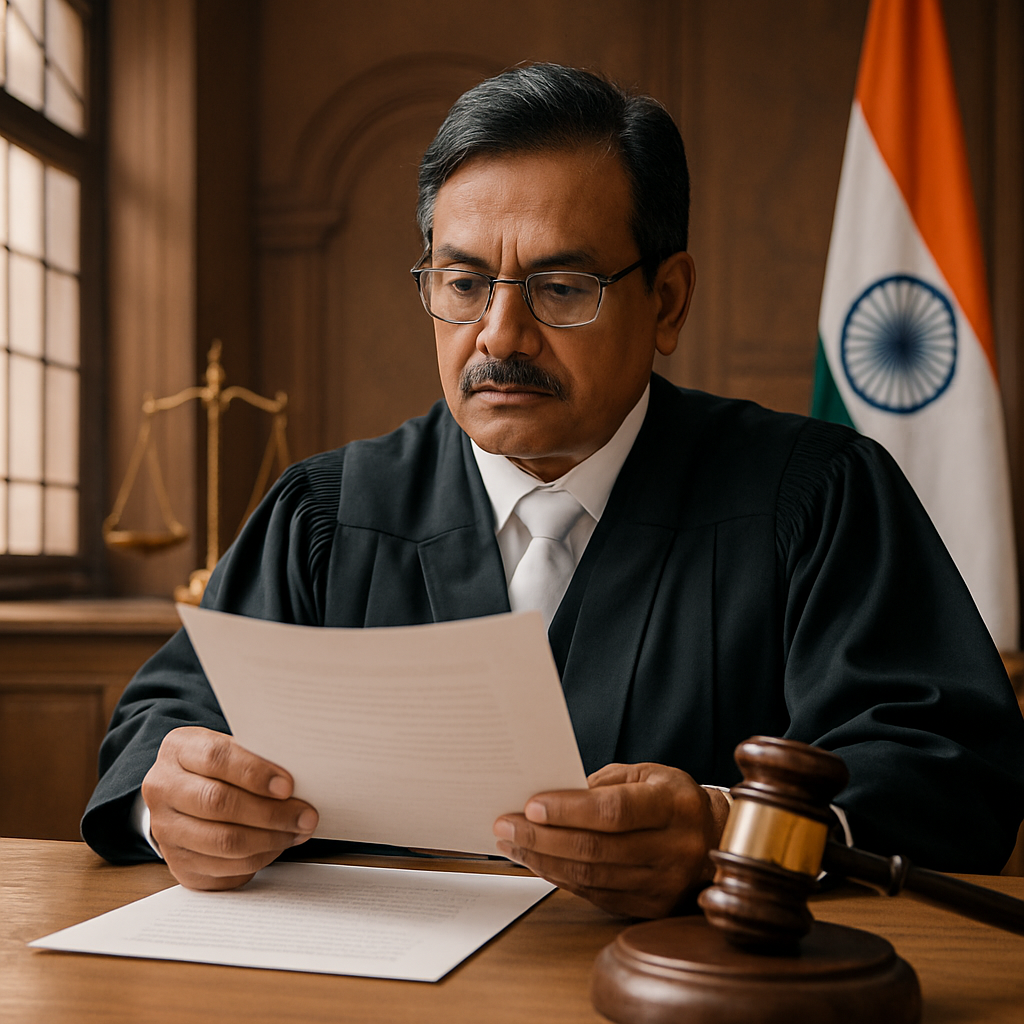Simplified Explanation of the Judgment
In a significant decision, the Patna High Court allowed a retired District & Sessions Judge’s writ petition challenging a departmental punishment order that deferred his promotion to the super-time scale. The Court held that the inquiry process was fundamentally flawed due to the absence of oral evidence and proper documentation.
The case revolved around two separate penalties imposed on the petitioner — one was a censure and the other a deferment of super-time scale benefits for one year. Both orders were issued by the High Court’s administrative side. The petitioner approached the Court, seeking to quash these penalties and grant the promotional benefits due to him.
The petitioner was accused of misusing a “current duty” arrangement on 11 February 2004. He had reportedly left his station in Jehanabad to attend an oath ceremony at the Patna High Court without prior permission and allegedly signed order sheets later that day, which were prepared in his absence. A complaint was filed by a supposedly fictitious person, alleging misuse of his position.
However, during the inquiry, no witnesses were examined to prove the allegations. On the contrary, the petitioner submitted credible evidence, including witness testimony from a doctor confirming his mother’s illness, and his court staff supporting that he had sought permission for “current duty” that morning.
The Court observed that the punishment was based on unsubstantiated allegations and a deficient inquiry. No departmental witness was presented, nor were relevant documents like order sheets and applications formally proved. There was also no proof that assigning judicial work to another officer during “current duty” was impermissible under the prevailing norms.
Relying on precedents, especially Roop Singh Negi v. Punjab National Bank (2009) and Saroj Kumar Sinha v. State of U.P. (2010), the Court held that the departmental inquiry lacked evidentiary support, which made the punishment unsustainable.
However, in the second writ petition related to a censure imposed for judicial overreach in a revision order, the Court upheld the minor penalty. The petitioner had admitted to passing an interim stay in a criminal revision that was not maintainable. The Court found that, since a show cause notice was issued and the explanation was considered, the punishment of censure was lawful and required no formal inquiry under applicable rules.
Significance or Implication of the Judgment
This judgment reinforces the principle that disciplinary actions against judicial officers must follow due process and be supported by credible evidence. It also affirms that minor penalties like censure can be imposed without a full-fledged inquiry if procedural safeguards like show cause and explanation are followed.
For government servants, this case highlights the necessity for a well-documented and witness-backed inquiry before imposing punishments that affect career advancement or pension benefits. For the judiciary, it underscores the need for transparency and adherence to established norms in administrative actions.
Legal Issue(s) Decided and the Court’s Decision
- Whether a departmental punishment can be sustained without examining any witnesses or proving documents?
- Court’s Decision: No. The Court quashed the punishment for deferment of super-time scale due to lack of evidence and non-compliance with principles of natural justice.
- Whether censure imposed without a departmental inquiry is valid?
- Court’s Decision: Yes. The Court upheld the censure as a minor penalty for which formal inquiry is not mandatory under Bihar Government Servant Rules.
- Whether assigning work to another officer under ‘current duty’ was impermissible?
- Court’s Decision: No such rule or proof was presented to establish its impermissibility.
Judgments Referred by Parties (with citations)
- Devendra Prasad v. State of Bihar & Ors, LPA No. 1302 of 2017
- Roop Singh Negi v. Punjab National Bank, (2009) 2 SCC 570
Judgments Relied Upon or Cited by Court (with citations)
- Roop Singh Negi v. Punjab National Bank, (2009) 2 SCC 570
- Nirmala J. Jhala v. State of Gujarat, (2013) 4 SCC 301
- State of U.P. v. Saroj Kumar Sinha, (2010) 2 SCC 772
- Satyendra Singh v. State of U.P. & Anr., SLP (Civil) No. 29758 of 2018
Case Title
Sudhansu Kumar Lal v. The High Court of Judicature at Patna & Anr.
Case Number
CWJC Nos. 14897 and 14896 of 2011
Citation(s)– 2025 (1) PLJR 121
Coram and Names of Judges
Hon’ble the Chief Justice K. Vinod Chandran
Hon’ble Mr. Justice Partha Sarthy
Names of Advocates and who they appeared for
- Mr. Jitendra Singh, Sr. Advocate — For Petitioner (CWJC No. 14897/2011)
- Mr. Harsh Singh, Advocate — For Petitioner (CWJC No. 14896/2011)
- Mr. Sanjeev Kumar, Standing Counsel — For Patna High Court
- Mr. Md. N. Hoda Khan, SC-18 — For the State (CWJC No. 14897/2011)
- Mr. Md. Harun Qureshi and Mr. Md. Irshad — ACs to SC-01
- Mr. Kumar Alok, SC-7 — For the State (CWJC No. 14896/2011)
Link to Judgment
MTUjMTQ4OTcjMjAxMSMxI04=-ehDZXlBJ18U=
If you found this explanation helpful and wish to stay informed about how legal developments may affect your rights in Bihar, you may consider following Samvida Law Associates for more updates.









